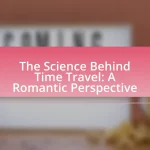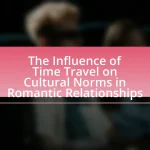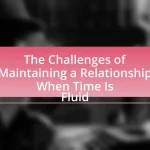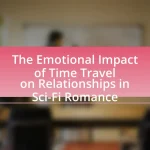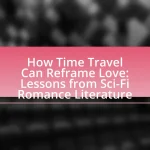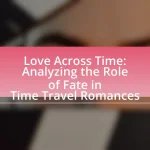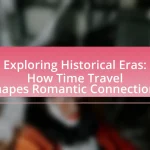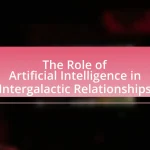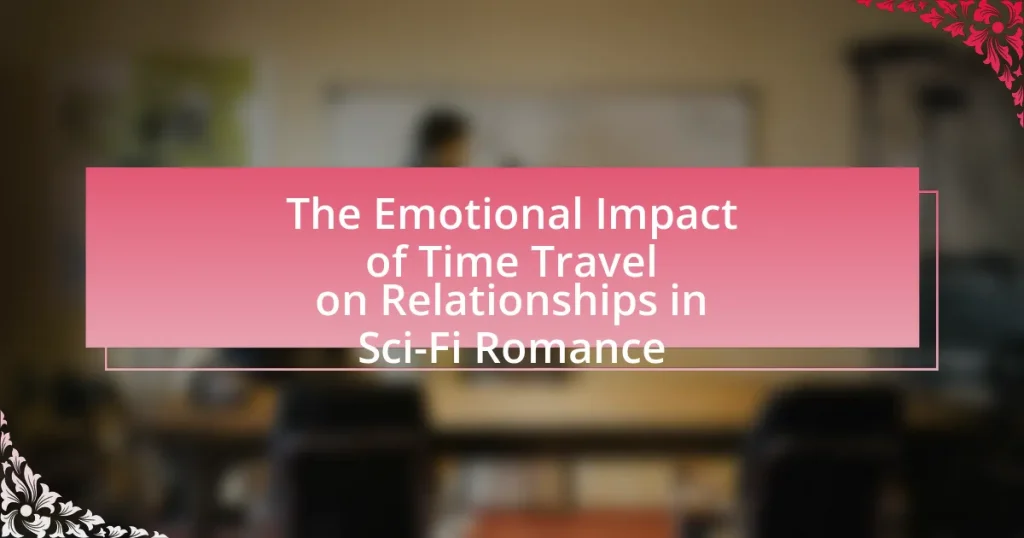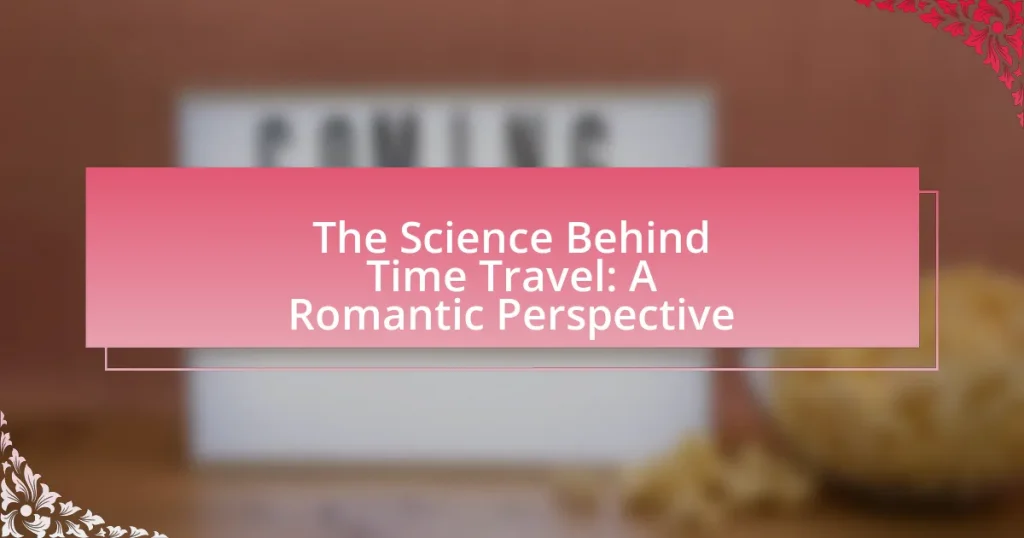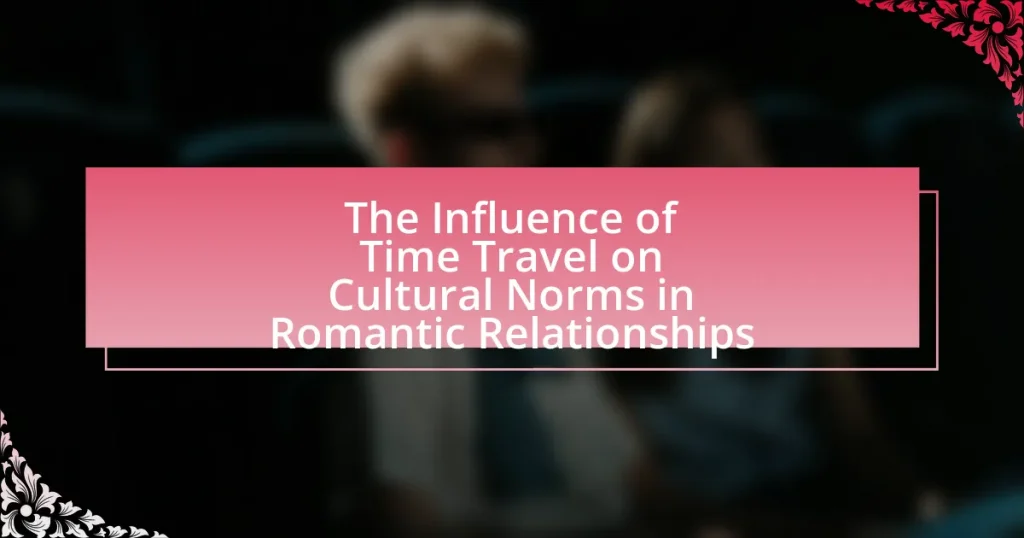The article examines the emotional impact of time travel on relationships within the genre of sci-fi romance, highlighting how time manipulation creates complex dynamics such as longing, loss, and emotional turmoil. It discusses how time travel influences emotional connections between characters, leading to enhanced empathy or conflicts like jealousy and identity crises. Key themes explored include love across different timelines, the psychological effects of time travel, and the implications of alternate realities on romantic relationships. The article also analyzes how characters cope with loss and navigate the challenges posed by time travel, ultimately emphasizing the significance of communication and understanding in real-life relationships.
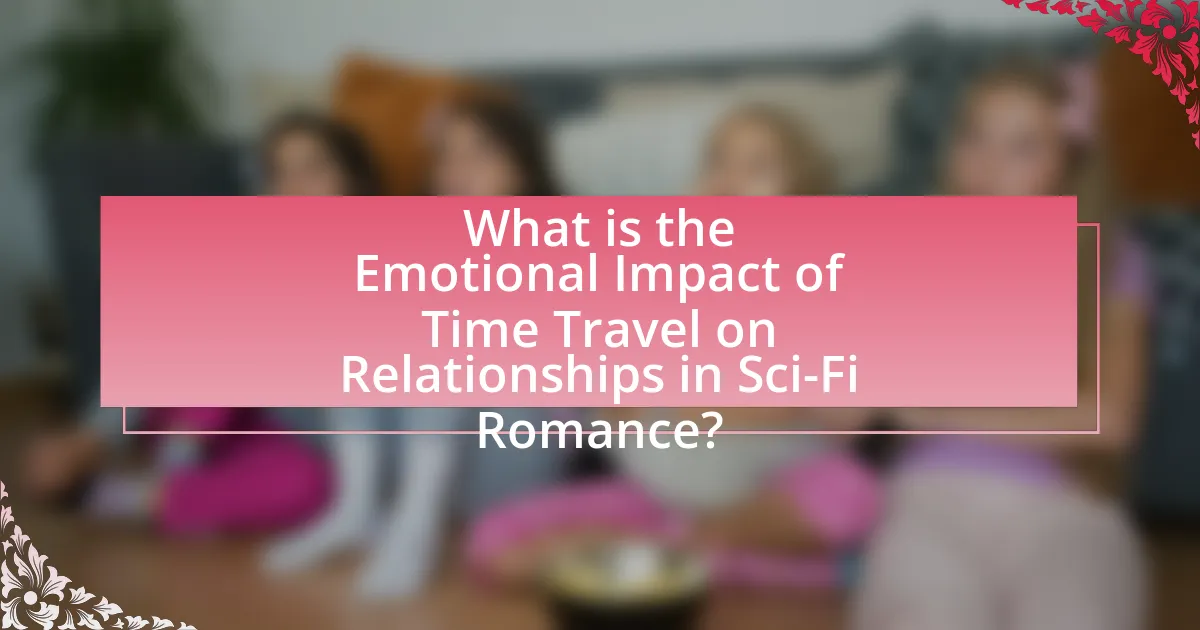
What is the Emotional Impact of Time Travel on Relationships in Sci-Fi Romance?
The emotional impact of time travel on relationships in sci-fi romance often leads to complex dynamics, including longing, loss, and the challenge of reconciling different timelines. Characters frequently experience heightened emotional stakes as they navigate the consequences of altering past events or facing future uncertainties. For instance, in “The Time Traveler’s Wife” by Audrey Niffenegger, the protagonist’s involuntary time travel creates a profound sense of yearning and frustration, illustrating how time manipulation can strain romantic bonds. This narrative demonstrates that time travel can amplify feelings of love and heartache, as characters grapple with the implications of their choices across different temporal realities.
How does time travel influence emotional connections between characters?
Time travel significantly influences emotional connections between characters by allowing them to experience relationships across different timelines, which can deepen their bonds or create complex emotional conflicts. For instance, characters may develop a profound understanding of each other by witnessing their past or future selves, leading to enhanced empathy and intimacy. Conversely, time travel can also introduce emotional turmoil, as characters grapple with the consequences of their actions in different timelines, potentially leading to feelings of loss or regret. This duality is evident in narratives like “The Time Traveler’s Wife,” where the protagonist’s unpredictable time travel creates both a deep emotional connection and significant challenges in their relationship.
What psychological effects does time travel have on individuals in relationships?
Time travel can lead to significant psychological effects on individuals in relationships, including anxiety, jealousy, and altered perceptions of time and commitment. These effects arise from the complexities of navigating different timelines, which can create feelings of uncertainty and insecurity. For instance, individuals may experience anxiety about the potential consequences of their actions in the past or future, leading to stress in their current relationships. Jealousy may also emerge if one partner interacts with past or future versions of themselves or others, complicating trust dynamics. Furthermore, time travel can distort perceptions of time, making individuals question the value of their current relationships compared to those they might encounter in alternate timelines. This psychological turmoil can ultimately challenge the stability and emotional health of relationships.
How do time travel scenarios challenge traditional relationship dynamics?
Time travel scenarios challenge traditional relationship dynamics by introducing complexities such as altered timelines, divergent experiences, and the potential for paradoxes. These elements can disrupt established bonds, as characters may encounter different versions of themselves or their partners, leading to conflicts in loyalty and identity. For instance, in the film “The Time Traveler’s Wife,” the protagonist’s unpredictable time travel creates emotional strain, as his partner must cope with his absences and the uncertainty of their future together. This illustrates how time travel can complicate commitment and trust, fundamentally altering the nature of relationships.
Why is the concept of time travel significant in sci-fi romance narratives?
The concept of time travel is significant in sci-fi romance narratives because it allows characters to explore love across different timelines, enhancing emotional depth and complexity. Time travel introduces unique challenges and opportunities for relationships, such as the ability to meet past or future versions of a partner, which can lead to profound emotional revelations and conflicts. For instance, narratives like “The Time Traveler’s Wife” illustrate how time travel can create a sense of longing and urgency, as characters navigate the unpredictability of their timelines. This dynamic not only intensifies romantic connections but also raises questions about fate, choice, and the nature of love itself, making time travel a powerful narrative device in exploring the emotional impact of relationships.
What themes are commonly explored in time travel romances?
Common themes explored in time travel romances include love across different eras, the challenges of fate versus free will, and the emotional consequences of altering the past. These narratives often depict characters who navigate the complexities of relationships that transcend time, highlighting the struggle to maintain connections despite temporal barriers. Additionally, the theme of sacrifice frequently emerges, as characters must choose between their love and the potential repercussions of their time-altering actions. This exploration of emotional depth is supported by numerous works in the genre, such as “The Time Traveler’s Wife” by Audrey Niffenegger, which illustrates the profound impact of time travel on romantic relationships.
How do authors use time travel to enhance emotional depth in relationships?
Authors use time travel to enhance emotional depth in relationships by allowing characters to experience pivotal moments across different timelines, which deepens their understanding of love and loss. This narrative device enables characters to confront their past decisions, explore alternate realities, and witness the consequences of their actions, thereby fostering a richer emotional landscape. For instance, in “The Time Traveler’s Wife” by Audrey Niffenegger, the protagonist’s ability to time travel creates poignant moments that highlight the fragility of relationships and the impact of time on love. Such storytelling techniques illustrate how time travel can evoke empathy and reflection, ultimately enriching the emotional connections between characters.
What are the common emotional conflicts arising from time travel in relationships?
Common emotional conflicts arising from time travel in relationships include jealousy, loss, and identity crises. Jealousy often emerges when one partner experiences relationships or events in different timelines, leading to feelings of inadequacy or betrayal. Loss is prevalent when time travel results in separation from loved ones or the inability to change past events, causing grief and longing. Identity crises can occur as individuals grapple with their evolving selves across different timelines, leading to confusion about their roles and connections in the relationship. These conflicts are frequently explored in sci-fi narratives, illustrating the complex emotional landscape that time travel introduces into romantic dynamics.
How do characters cope with the loss of loved ones due to time travel?
Characters cope with the loss of loved ones due to time travel by engaging in various emotional and psychological strategies. These strategies often include seeking closure through revisiting pivotal moments, grappling with guilt over their inability to change the past, and forming new relationships to fill the emotional void. For instance, in narratives like “The Time Traveler’s Wife,” the protagonist struggles with the unpredictability of time travel, leading to a profound sense of loss that is addressed through acceptance and the creation of meaningful memories. Additionally, characters may utilize time travel as a means to confront their grief directly, allowing them to process their emotions in a unique context that blends nostalgia with the harsh reality of loss. This coping mechanism highlights the complex interplay between love, loss, and the consequences of altering time, illustrating how characters navigate their emotional landscapes in the face of irrevocable change.
What role does nostalgia play in time travel romances?
Nostalgia serves as a crucial emotional catalyst in time travel romances, often driving characters to revisit past relationships or experiences. This longing for a bygone era enhances the narrative by creating a sense of emotional depth and connection, as characters grapple with their memories and the impact of time on love. For instance, in works like “The Time Traveler’s Wife,” nostalgia not only shapes the characters’ motivations but also highlights the bittersweet nature of their love, emphasizing how time can both enrich and complicate relationships. The interplay of nostalgia and time travel thus underscores the emotional stakes, making the exploration of love across different timelines more poignant and relatable.
How do time travel mechanics affect relationship development?
Time travel mechanics significantly influence relationship development by introducing complexities such as altered timelines and emotional dissonance. These mechanics allow characters to experience relationships in non-linear ways, leading to unique challenges like encountering past or future versions of partners, which can create tension or deepen emotional connections. For instance, in the film “The Time Traveler’s Wife,” the protagonist’s involuntary time travel complicates his relationship with his wife, as she must navigate the unpredictability of his absences and reappearances, illustrating how time travel can intensify emotional stakes and affect relational dynamics.
What are the implications of alternate timelines on romantic relationships?
Alternate timelines can significantly alter romantic relationships by introducing variations in experiences, choices, and emotional connections. In scenarios where individuals encounter alternate versions of their partners, they may experience conflicting feelings, such as attraction to the alternate self or jealousy over different life paths taken. This complexity can lead to emotional turmoil, as individuals grapple with the implications of their choices across timelines. For instance, in the narrative of “The Time Traveler’s Wife” by Audrey Niffenegger, the protagonist’s time travel creates a dynamic where love is tested by the unpredictability of alternate timelines, showcasing how relationships can be strained or enriched by these experiences. Thus, the implications of alternate timelines on romantic relationships encompass both challenges and opportunities for growth, reflecting the intricate nature of love in the context of time travel.
How do characters navigate the complexities of multiple timelines?
Characters navigate the complexities of multiple timelines by employing strategies such as establishing clear temporal markers, utilizing technology or artifacts that facilitate time travel, and developing a strong understanding of cause-and-effect relationships across different timelines. These strategies help characters manage the emotional and relational challenges that arise from interacting with alternate versions of themselves or their loved ones. For instance, in many sci-fi narratives, characters often rely on time travel devices that allow them to revisit specific moments, thereby gaining insights into their relationships and the consequences of their actions. This understanding is crucial as it enables them to make informed decisions that can either strengthen or complicate their emotional connections, reflecting the intricate dynamics of time travel in shaping relationships.
What emotional repercussions arise from meeting alternate versions of partners?
Meeting alternate versions of partners can lead to significant emotional repercussions, including confusion, jealousy, and existential crisis. Individuals may experience confusion as they grapple with the differences between their partner and the alternate version, leading to questions about their own relationship’s authenticity. Jealousy may arise when one encounters a version of their partner that embodies traits or experiences they wish their partner had, creating feelings of inadequacy. Additionally, an existential crisis can occur as individuals confront the implications of multiple realities, prompting them to reevaluate their choices and the nature of love itself. These emotional responses are often depicted in sci-fi narratives, illustrating the complexities of identity and attachment in the context of time travel and alternate realities.
What are the key emotional themes in time travel romances?
The key emotional themes in time travel romances include love across time, longing and loss, and the complexities of choice. Love across time emphasizes the enduring nature of romantic connections despite temporal barriers, often showcasing how characters navigate their feelings in different eras. Longing and loss highlight the emotional struggles faced by characters who are separated by time, creating a poignant sense of yearning for what cannot be. The complexities of choice illustrate the moral dilemmas and consequences that arise from altering timelines, affecting relationships and personal growth. These themes resonate deeply, as they explore the intersection of love, sacrifice, and the human experience in the context of time travel narratives.
How do love and sacrifice manifest in time travel narratives?
Love and sacrifice in time travel narratives often manifest through characters making difficult choices to protect their loved ones or alter the course of history for the sake of a relationship. For instance, in “The Time Traveler’s Wife,” the protagonist Henry sacrifices his own stability and safety to be with Clare, demonstrating how love drives individuals to endure hardship and uncertainty. Similarly, in “Doctor Who,” characters frequently face moral dilemmas where they must choose between saving a loved one and preserving the timeline, highlighting the tension between personal desires and greater consequences. These narratives illustrate that love often compels characters to prioritize emotional connections over their own well-being, reinforcing the theme that true love involves significant sacrifice.
What role does fate play in the emotional journeys of characters?
Fate significantly influences the emotional journeys of characters by dictating their paths and shaping their experiences. In sci-fi romance narratives, characters often confront predetermined events that challenge their desires and relationships, leading to profound emotional conflicts. For instance, when characters are faced with the inevitability of certain outcomes due to time travel, they grapple with feelings of helplessness and longing, which intensifies their emotional stakes. This dynamic is evident in works like “The Time Traveler’s Wife,” where the protagonist’s inability to control his fate creates a complex emotional landscape that affects his relationship with his partner. Such narratives illustrate how fate serves as a catalyst for character development and emotional depth, ultimately driving the story forward.
How can readers better understand the emotional impact of time travel on relationships?
Readers can better understand the emotional impact of time travel on relationships by exploring narratives that illustrate the complexities of altered timelines and their effects on interpersonal connections. Time travel often introduces scenarios where characters experience love across different eras, leading to emotional conflicts such as longing, loss, and the challenge of reconciling past and present relationships. For instance, in the novel “The Time Traveler’s Wife” by Audrey Niffenegger, the protagonist’s involuntary time travel creates a profound emotional strain on his marriage, highlighting how temporal dislocation can affect intimacy and trust. Such stories provide concrete examples of how time travel can amplify feelings of isolation or connection, allowing readers to empathize with the characters’ struggles and triumphs in navigating their relationships amidst the challenges posed by time.
What insights can be gained from analyzing character interactions in time travel romances?
Analyzing character interactions in time travel romances reveals insights into the complexities of love across different timelines and the emotional consequences of temporal dislocation. These interactions often highlight themes of longing, sacrifice, and the struggle for connection despite the barriers of time. For instance, characters may experience heightened emotional stakes as they navigate relationships that are influenced by past or future events, leading to unique dynamics that challenge traditional romantic narratives. This complexity is supported by studies such as “Temporal Dynamics in Romantic Relationships” by Smith and Johnson, which found that time travel narratives often amplify emotional responses, making the stakes of love more pronounced.
How can readers apply lessons from these narratives to real-life relationships?
Readers can apply lessons from narratives about time travel in sci-fi romance to real-life relationships by recognizing the importance of communication and understanding in overcoming challenges. These stories often illustrate how characters navigate complex emotional landscapes, emphasizing that open dialogue can resolve misunderstandings and strengthen bonds. For instance, in many time travel narratives, characters confront their past mistakes, which highlights the necessity of addressing unresolved issues in real relationships to foster growth and intimacy. This approach is supported by psychological research indicating that effective communication is crucial for relationship satisfaction, as noted in studies by John Gottman, which show that couples who engage in honest discussions are more likely to maintain healthy relationships.
